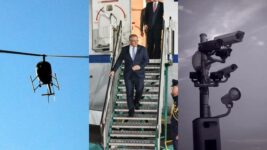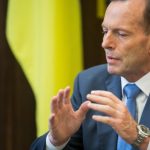The Morrison Government’s Term Has Shown Terror Laws Target Us All

A general shift towards a more authoritarian form of governance is becoming apparent to a broader section of the populace.
No longer are people blindly turning their heads away with carefree statements, such as, “I’ve got nothing to hide,” as they’ve become aware that surveillance laws have made such inroads into their private lives that they literally have nothing left to secret away.
The transformation of Australia into the world’s most secretive democracy, as the New York Times put it, has been facilitated by the bipartisan passing of over 90 pieces of national security/counterterrorism legislation since the 2001 9/11 attacks were perpetrated in New York.
Despite the stated target of these laws being terrorists – specifically those of the Islamic variety – local civil liberties advocates have long been warning that these laws are incrementally eroding the rights of all citizens and residents.
And the practical understanding that these laws can be turned on the general populace has really taken hold under the current Morrison government, as its term in office has been marked by press raids, political prosecutions, the targeting of critics and a retreat into opaque rule.
Slim pickings
The UN General Assembly adopted Resolution 1373 seven days after 9/11. This called upon members states to enact terrorism offences in domestic law with accompanying stiff penalties.
Yet, legal experts explain that our nation has followed through on this pledge to a much greater degree than other comparable democracies.
The 93rd such Australian terror-related bill was passed last November.
And while it’s true, the 2001 New York terror attacks shocked this country, with the 2002 Bali Bombings – which saw 88 Australians killed – further bringing the threat of terrorism home, 20 years on, with a truckload terror laws and no apparent terrorists, many are now asking what it’s all for.
On the passing of the recent laws that established a system whereby convicted terrorists can be placed under ongoing community supervision three years after their sentences have expired, Home Affairs set out that only 95 people have been convicted of terrorism-related offences since 2001.
So, it would seem that the threat of Islamic terrorism is getting a bit thin on the ground.
In September 2020, when former attorney general Christian Porter introduced the new bill, as well as in November, when current AG Michaelia Cash spruiked its values, both chief lawmakers referred to terror incidents overseas – rather than locally – to justify the need for these laws.
Manufacturing terrorists
The NSW Bureau of Crime Statistic and Research (BOCSAR) published its Terrorism Offending in NSW report in January last year, acknowledging that since 9/11 “there has been a considerable increase in the number of anti-terror laws” but a dearth of research on how they’ve been utilised.
The study found that between July 2002 and May 2020, NSW courts had convicted 48 individuals on 72 terror-related offences. However, two-thirds of these were due to proactive policing, which means tracking down offenders before a crime had been perpetrated.
UNSW Faculty of Law senior lecturer Dr Vicki Sentas told Sydney Criminal Lawyers in 2019 that proactive policing differs from traditional forms in that it involves preventative measures, such as surveillance, to predict and disrupt crime before it happens.
This shift towards proactive policing has been across the board, however in terms of terrorism, it’s led to the establishment of powers that allow for searches in anticipation of terror acts, prolonged interrogative detention with no charge, as well as orders restricting movement and association.
BOCSAR researcher Stewart Boiteux pointed out that prior to the rollout of the terror laws, the behaviour captured by them was prosecuted under regular criminal law.
While most of those convicted of the new terror-related offences have been males from areas “associated with the highest level of socioeconomic disadvantage”.
And in terms of the convictions, 39 percent were planning-related, while 21 percent involved suspects breaching control or supervision orders that had been imposed upon them.
Dutton’s terror law bonanza
The majority of the terror laws passed under Morrison’s watch have been crafted by former home affairs minister Peter Dutton. And although he transferred to defence last March, with the aim of promoting a pending war with China, some of his old handy work has continued to be enacted.
Passed in August, the Identify and Disrupt Bill established a three-tiered warrant system, which permits agents to access devices and alter or delete material, gather information from online accounts, and even take them over. These laws can be applied to nonsuspects as well.
Late 2020 saw the passing of Dutton’s ASIO Bill, which expanded the agency’s questioning regime beyond terrorism to include espionage, politically motivated violence and foreign interference. It dropped the questioning age down to 14 and removed the need for a warrant to track citizens.
And 2018’s TOLA Act established a three-tiered system that enables law enforcement to require communications providers to allow access to their encrypted messaging systems. This can involve an order to assist with decryption or a requirement to build backdoor access into a system.
So, while Dutton has done exceptionally well in expanding the reach of the surveillance state, it should be asked whether the incursions these laws make into the daily lives of the general populace are really worth it, when compared to the few real terrorists they’re likely to track down.
Authoritarian bent
The reason why the volume and reach of these national security laws was able to go beyond that of other Five Eyes nations is that, unlike them, Australia has no bill of rights protecting citizens freedoms and liberties at the federal level, and hence preventing much of these measures.
The implications of these laws, however, are slowly coming to the fore. The AFP press raids in June 2019 utilised warrants passed in the TOLA Act. The closed court procedures applied to the Witness K and Collaery cases are contained under 2004 passed national security laws.
And while not directly linked to the great framework of federal laws, the use of the NSW police terrorism unit’s Fixated Persons Investigation Unit to apprehend a 21-year-old YouTuber for mocking the then NSW deputy premier last June, is a sign of the society that’s being created.
Creeping authoritarianism used to be the parlance of tin foil hatters, but now it’s a term bandied about in the mainstream media. And the real issue here is that while so many of these far-reaching powers have been passed, it’s doubtful anyone actually understands their full implications.
Critics warn that if an extremely reactionary government got into power, Australians would soon learn just how far these laws can reach.
And considering his form over the last three years, it’s probably best not to find out if a Scott Morrison emboldened by being re-elected yet again could be the politician to take us there.







